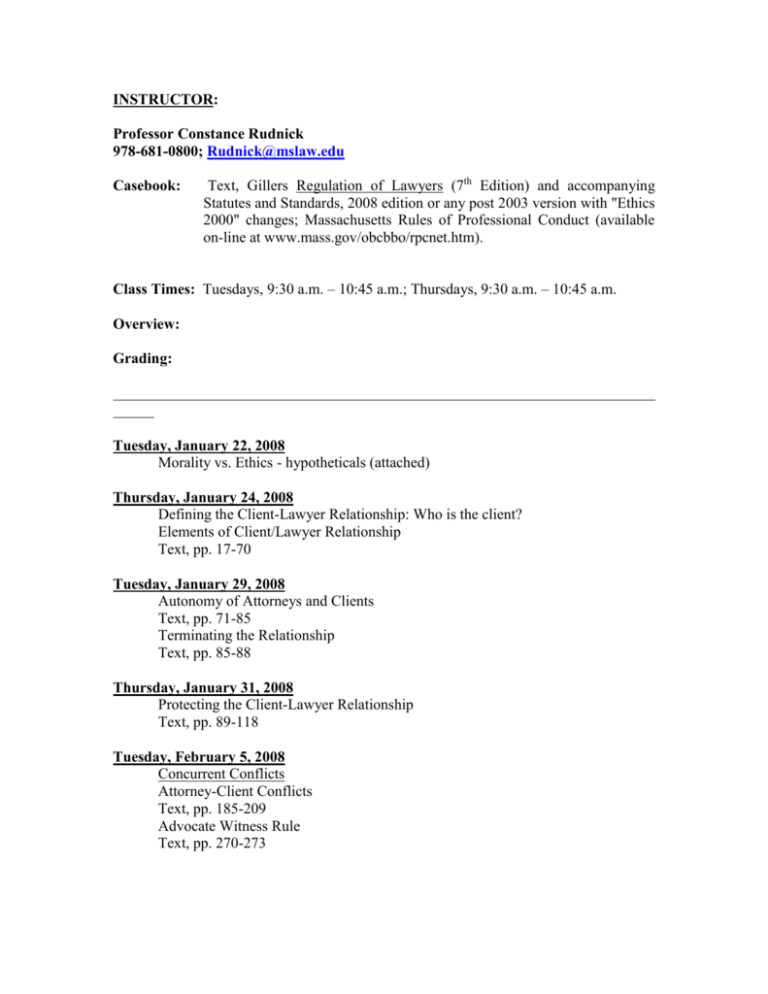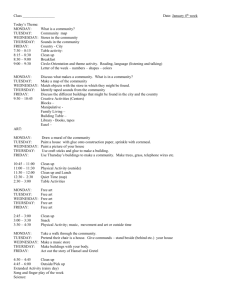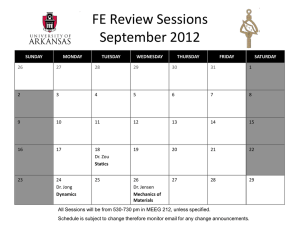INSTRUCTOR: - Massachusetts School of Law
advertisement

INSTRUCTOR: Professor Constance Rudnick 978-681-0800; Rudnick@mslaw.edu Casebook: Text, Gillers Regulation of Lawyers (7th Edition) and accompanying Statutes and Standards, 2008 edition or any post 2003 version with "Ethics 2000" changes; Massachusetts Rules of Professional Conduct (available on-line at www.mass.gov/obcbbo/rpcnet.htm). Class Times: Tuesdays, 9:30 a.m. – 10:45 a.m.; Thursdays, 9:30 a.m. – 10:45 a.m. Overview: Grading: Tuesday, January 22, 2008 Morality vs. Ethics - hypotheticals (attached) Thursday, January 24, 2008 Defining the Client-Lawyer Relationship: Who is the client? Elements of Client/Lawyer Relationship Text, pp. 17-70 Tuesday, January 29, 2008 Autonomy of Attorneys and Clients Text, pp. 71-85 Terminating the Relationship Text, pp. 85-88 Thursday, January 31, 2008 Protecting the Client-Lawyer Relationship Text, pp. 89-118 Tuesday, February 5, 2008 Concurrent Conflicts Attorney-Client Conflicts Text, pp. 185-209 Advocate Witness Rule Text, pp. 270-273 Thursday, February 7 thru Tuesday, February 12, 2008 Client-Client Conflicts Text, pp. 209-269 Thursday, February 14 thru Tuesday, February 19, 2008 Successive Conflicts Text, pp. 275-304 Government Lawyers 304-312 Thursday, February 21 thru Thursday, February 28, 2008 Ethics in Advocacy Text, pp. 315-400 Add=l Reading: Commonwealth v. Mitchell, 781 N.E.2d 1237 (Mass. 2003) Tuesday, March 4, 2008 Real Evidence Text, pp.401-420 Thursday, March 6, 2008 Fees Text, pp. 119-149, 168-182 Add=l. Reading: In the Matter of Shoepfer, 687 NE2d 391 (1997) Spring Break – March 9-16 Tuesday, March 18 thru Thursday, March 20, 2008 Negotiations and Transactional Matters Text, pp. 421-448 Lawyers for Entities Text, pp. 449-492 Tuesday, March 25, 2008 Judges Text, pp. 493-533 Thursday, March 27, 2008 Reducing Professional Failure: Admission to the Bar Text, pp. 537-562 Tuesday, April 1, 2008 Transient Lawyers and Multi-jurisdictional practice Text, pp. 562-588 Thursday, April 3, 2008 Ethical Duty of Competence Supervisor Responsibilities Unauthorized Practice Text, pp. 588-605 Tuesday, April 8 thru Thursday, April 10, 2008 Malpractice Text, pp. 607-652 Tuesday, April 15, 2008 Beyond Malpractice Text, pp. 652-671 Thursday, April 17, 2008 Bar Discipline Text, pp. 671-707 Tuesday, April 22, 2008 Lay Participation in Legal Business Ancillary Services Text, pp. 725-759 Thursday, April 24 thru April 29, 2008 Advertising and Solicitation Text, pp. 799-840 Thursday, May 6 thru end of class To be announced-We will undoubtedly run longer than the schedule myfiles/ethics.syllabus LEGAL ETHICS SPRING, 2006 PROFESSOR RUDNICK 1) Your client has come to you for estate planning advice. He confidentially discloses to you that he is HIV positive, and he needs to plan his estate, even though the disease is under control. He also tells you that he has not disclosed this to his partner, and will not, because he has a prominent position in local politics, and his career will be over if this comes out. What can you do? 2) A client under indictment for murder confides in you that in a panic she threw the murder weapon (a loaded gun) out the window of her car into what she believed was an empty field. It turns out the field backs up on a school and playground where children play, and it is likely to be found by some child. If the police find the gun, they will check it for prints, and do other ballistic tests will provide proof of your client=s guilt. Ethical rules prohibit you from moving the evidence, and possibly from breaching the confidence. What do you do? 3) You are representing a person charged with murdering his wife. He has confessed to you that he committed the crime. However, on the day the wife was killed, she had a fight, in public, with her former lover, who threatened, in front of a restaurant full of people, to kill her if she didn=t come back to him. Can you defend the case by putting the witnesses to the argument on the stand and testifying truthfully as to what they saw, even though such a tactic would point the finger at an innocent man? 4) Should an applicant to the bar be denied admission because he is an active member of the Ku Klux Klan (no arrests, no convictions)? 5) You represented a young woman who opened up a health food store in a small suburban town by incorporating her and negotiating a lease with the landlord and contracts with suppliers. You do no further work for her. A year or so later, the lawyer is approached by another person who desires to open up a store which will compete with that operated by your former client. You believe the town will not sustain two health food stores, and the earlier client will suffer. 6) A client confesses to you he was involved in a murder for which another person has been convicted and is serving life. The police had a suspicion your client was involved, but they never charged him. The client absolutely forbids you to tell the authorities. He believes (and rightfully so) that any information raising the client=s involvement will reopen the case, and result in an indictment. What do you do?







